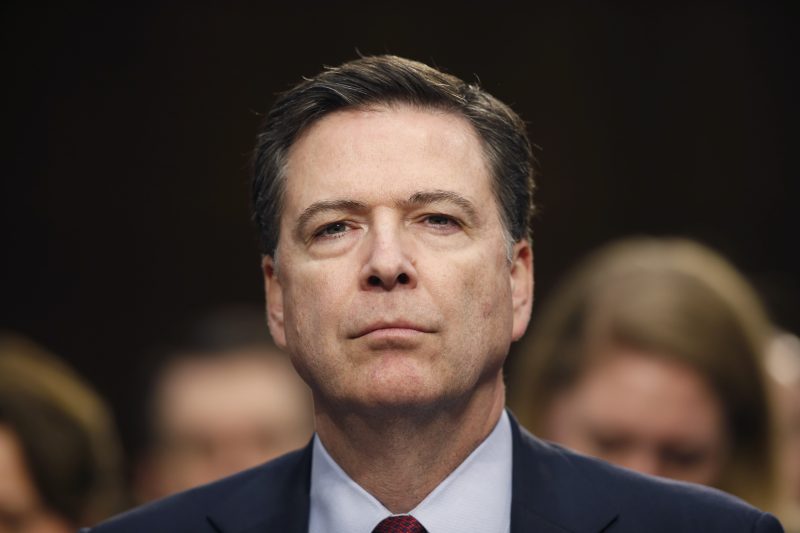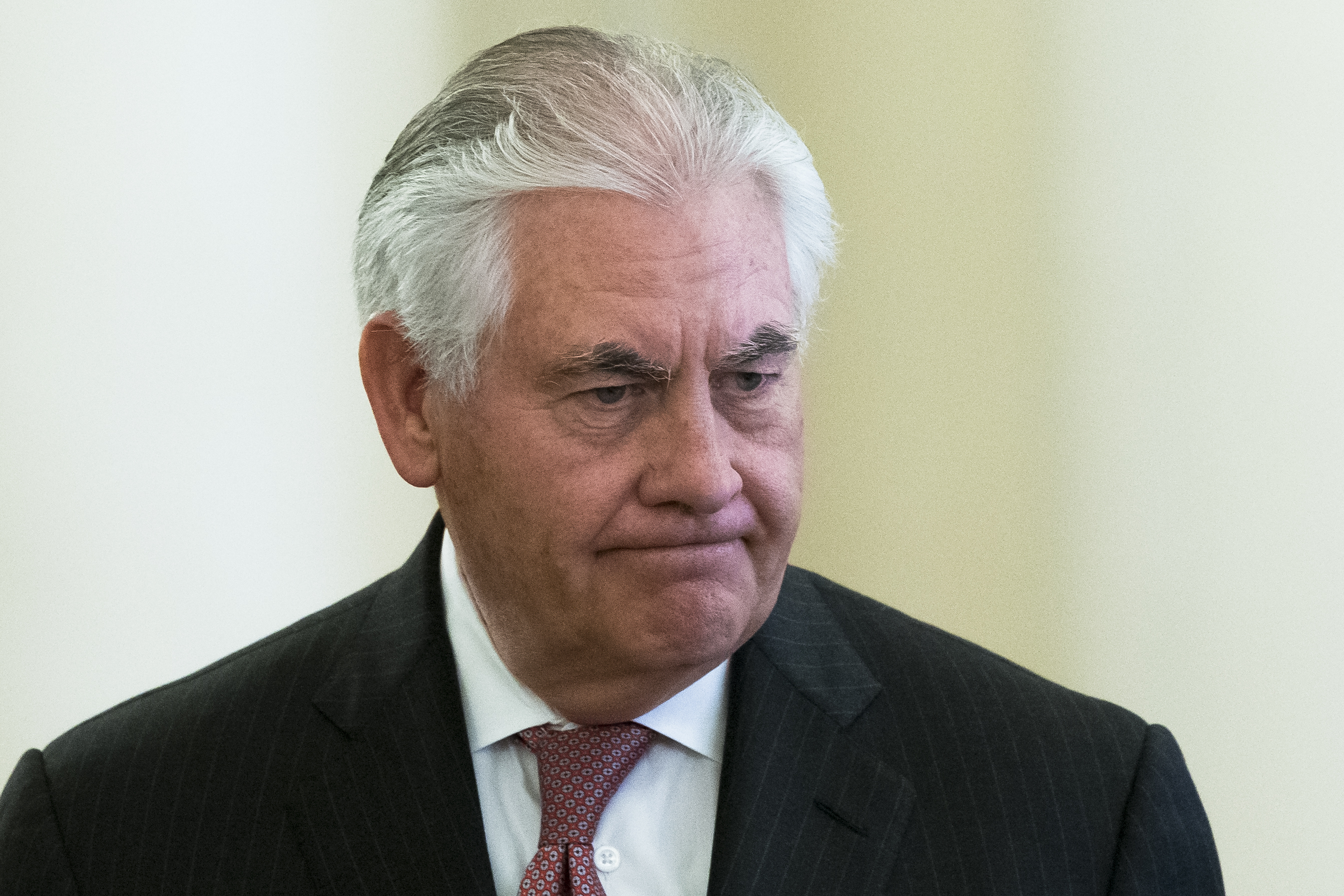Secretary of State Rex Tillerson was asked on Sunday why he didn’t bring up the issue of Kremlin interference in the 2016 election when he met with Russia’s foreign minister Sergey Lavrov earlier in the week.
“Can you get on a better footing with [Russia] if you don’t address this issue of the Russian interference?” NBC’s Chuck Todd asked Tillerson during an interview on “Meet the Press.” “I mean, your counterpart, the Russian foreign minister, Mr. Lavrov, said that you guys didn’t even talk about this issue of Russian interference in our election because, as he put it, President Trump himself says it’s fake news, so it’s not an issue. Why haven’t you brought it up with them?” Todd asked.
“Well, Chuck, I think we have such a broad range of important issues that have to be addressed in the US-Russia relationship,” Tillerson replied. “Obviously, the interference in the election is one of those. I think it’s been well-documented, it’s pretty well understood – the nature of that interference here and elsewhere.”
He added: “You know, these are not new tactics on the part of the Russian government, directed not only at us but at others. But again, I think we have to look at this relationship in its broadest contours, and there are many, many important areas which require attention if we are to bring it back to a relationship that we believe is necessary for the security of the US.”
Todd pushed back on Tillerson's assertion.
"Mr. Secretary, though, this is fundamental. They interfered with our democracy. I just don't understand how this is not a top issue for you to deal with, with them, in order to essentially start with a clean slate," Todd said. "Can't start with a clean slate until, maybe, they either own up to what they did, or we punish them in a way that they're not going to do this again."

Tillerson replied: "Well, Chuck, I think it's important to understand we're not trying to start with a clean slate ... We're starting with the slate we have, and all the problems that are on that slate. We don't dismiss any of them, we don't give anyone a free pass on any of them. They're part of the entire nature of the discussion we're having with the Russians. And yes, there are a large number of issues that we have to get around to addressing in order to put this relationship back together, if that is indeed possible."
Todd later pressed Tillerson on whether he definitively believed that Russia had interfered in the US election.
"Is it clear in your mind that it is a fact the Russians interfered in our election?" Todd asked, noting that US intelligence reports concluded, and top officials have repeatedly confirmed, that Russia had played a hand in the 2016 election.
"I have seen the intelligence reports, Chuck," Tillerson said. "And yes, I don't think there's any question that the Russians were playing around in our electoral processes. Again, those intelligence reports also have indicated that it's inconclusive as to what, if any, effect it had."

Todd also mentioned the fact that the White House did not disclose that Lavrov and Russia's ambassador Sergey Kislyak - who is widely believed to be a Russian spy - were allowed in the Oval Office.
News of the meeting broke when Russian state media posted photos of the meeting online, while American media were barred from entering the room.
When Todd asked Tillerson why the White House didn't disclose that Kislyak was also in the meeting, Tillerson said he didn't know and that question should be posed to the White House.
Tillerson added that although Kislyak had been involved in his meeting with Lavrov, he didn't recall whether he had been notified that Kislyak would also be joining Lavrov and Trump in the Oval Office.
'Our institutions are under assault'
The topic of Russia has dogged Trump since his victory and into the first few months of his presidency. There are currently three investigations, conducted by the House, Senate, and FBI, that are focusing on the nature of Russia's interference in the 2016 election. Trump's associates, in particular, are being investigated over their suspected collusion with Russia to hand Trump the presidency.
The Trump-Russia controversy was thrust into the spotlight again this past week, when Trump made the bombshell decision to fire FBI director James Comey - the man overseeing the investigation into the Trump campaign's ties to Russia. Comey's firing prompted speculation over whether Trump removed him because he was angry about the Russia probe.

Initially, the White House said that the Russia investigation had nothing to do with Trump's decision and that he'd acted solely on the recommendations of deputy attorney general Rod Rosenstein and attorney general Jeff Sessions.
Later, however, Trump said he had been mulling over firing Comey for a while, and that Rosenstein's memo sealed the deal. The next day, Trump again shifted his stance, saying that he had already decided to fire Comey by the time he got Rosenstein's memo.
Comey has made no public statements since his abrupt removal, but Trump has lashed out at him amid the media firestorm following his decision. He also suggested that he may have recordings of his conversations with Comey.
"James Comey better hope that there are no 'tapes' of our conversations before he starts leaking to the press!" Trump tweeted on Friday.
A source close to Comey told NBC News that Comey "hopes there are tapes. That would be perfect."
Comey declined an invitation to testify before the Senate Intelligence Committee in a closed-door session, and a close associate told The New York Times that Comey was willing to testify - but only in public.
James Clapper, the former director of national intelligence, said in a Sunday morning interview that US intelligence agencies were "under assault," including from the president himself.
"I think in many ways our institutions are under assault both externally - and that's the big news here is the Russian interference in our election system - and I think as well our institutions are under assault internally," Clapper told CNN's Jake Tapper on "State of the Union." "The founding fathers, in their genius, created a system of three co-equal branches of government and a built-in system of checks and balances. I feel as though that is under assault and is eroding."

